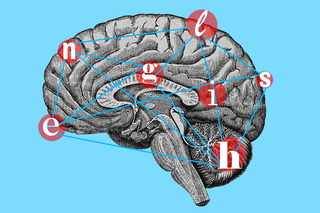
Cognitive Science Has an English Bias, Notes New Research
“The over-reliance on English in the cognitive sciences has led to an underestimation of the centrality of language to cognition at large.”

There’s an English-bias in cognitive science, and it affects how we understand the mind itself. A new study, published in Cell, noted that the field of cognitive science is dominated by English-speaking researchers and participants. “English differs from other languages in ways that have consequences for the whole of the cognitive sciences, reaching far beyond the study of language itself,” noted the study.
Language can tell us a lot about the human mind. But the fact that we only study how English determines how the mind works leads to big gaps in the field. For instance, the language we think in has “downstream” effects that aren’t related to language at all: it influences decision making, memory, perception, and more. “To live up to its mission of understanding the representational and computational capacities of the human mind, cognitive science needs to broaden the linguistic diversity represented in its participants and researchers,” the study authors wrote.
The study outlines a few examples of how it works. For instance, English speakers and thinkers have a left-to-right bias in how they remember and write things — whereas Arabic and Hebrew readers show a right-to-left bias based on their reading styles. Directness and clarity are prioritized in English, but Yoruba keeps vagueness central in conversations.
English is innately tied to socio-political and economic changes that took place in English history — making the language itself contextual. Accordingly, it’s shaped how we organize ourselves in the world — most notably through time. This isn’t to say that time doesn’t exist but rather, there are different ways of thinking about time other than clock-time. In his paper Time, Work Discipline and Industrial Capitalism, sociologist E.P Thompson describes the development of clock-time as synonymous with the development of the modern day capitalist work ethic. While this structure of time seems inevitable now, it isn’t — many indigenous communities measure time in vastly different ways, a fact that’s reflected in the language they have for measuring time itself. The sociologist Bourdieu observed that among the Kabyle community in Algeria, there is an “attitude of submission and of nonchalant indifference to the passage of time which no one dreams of mastering, using up, or saving.”
Related on The Swaddle:
New Research Links Social Bias to How People Recognize Faces
Another aspect of language and cognition is how the language we write in influences other preferences — moreover, while many other languages rely on sounds to communicate certain meanings, English doesn’t. This has an impact on how English speakers experience auditory sensory memory, among other things. Previous research has backed the centrality of language to someone’s cognitive experiences: thinking in a non-native language, for instance, has been shown to improved reasoning and decision-making. Some researchers have even proposed using this “foreign language effect” as a “nudge” to push people toward sustainable modes of living and eating.
Over the last century, research has been divided on the question of whether language and cognition are interdependent, or are two distinct processes of the mind. But over time, their relationship came to be understood as complicated at best. There are overlaps between them that carry implications for how society itself is structured: for instance, children are more likely to prefer native-speakers to others, which serves as a foundation for later social conflicts.
Moreover, some have pointed to a phenomenon that deeply intertwines questions about cognition, language, and society: cognitive imperialism. “Cognitive imperialism is a term that describes the mental, emotional, destructive, and traumatic effects of the experience of individuals and peoples forced to be educated and living under Eurocentric colonialism and imperialism,” one paper notes.
It’s a form of domination that goes beyond the cultural and enters the psyche itself: replacing one knowledge system with another, entirely different one. Educators note that English as a medium of instruction comes with cognitive biases that “defines success as assimilation to dominant values and norms, languages.”
Related on The Swaddle:
It’s Time to Recognize Culture Affects Our Understanding of Psychology
The implications of this are stark. In mental healthcare, for instance, cognitive behavioural therapy (CBT) remains one of the mainstays of psychotherapy to treat various illnesses. But CBT has been criticized for its reliance on Western cultural values as a foundation — which has in turn led to efforts to adapt CBT in non-Western contexts and languages. One study highlighted the importance of the mother tongue in CBT administered to immigrants seeking mental health care in another country.
Take the fact that assertiveness is a key concept in CBT: however, “Many Asian cultures do not have the concept of assertiveness,” notes one 2020 study. “However, patients can be taught assertiveness techniques in a culturally sensitive manner, for example learning the ‘apology technique,’ in which they use phrases such as ‘With a big apology, I would like to seek your permission to disagree,'” the researchers of the 2020 the observe.
Clearly, language influences our cognitive biases. “… the study of worldwide linguistic diversity offers a vast array of phenomena with untapped potential for the broader study of the mind,” notes the current study. But cognitive science research, by focusing overwhelmingly on English and English-speakers, suffers from gaps that don’t account for the role of sociological processes and histories that inform how people think, act, and relate with the world.
As the researchers note: “The fact that linguistic diversity is not better represented in the agenda of the cognitive sciences reflects its failure to live up to its original mission of developing an interdisciplinary exploration of ‘the mind’; it may be its ‘original sin’.”
Rohitha Naraharisetty is a Senior Associate Editor at The Swaddle. She writes about the intersection of gender, caste, social movements, and pop culture. She can be found on Instagram at @rohitha_97 or on Twitter at @romimacaronii.
Related


The Plague May Have Shaped Our Present Immunity
